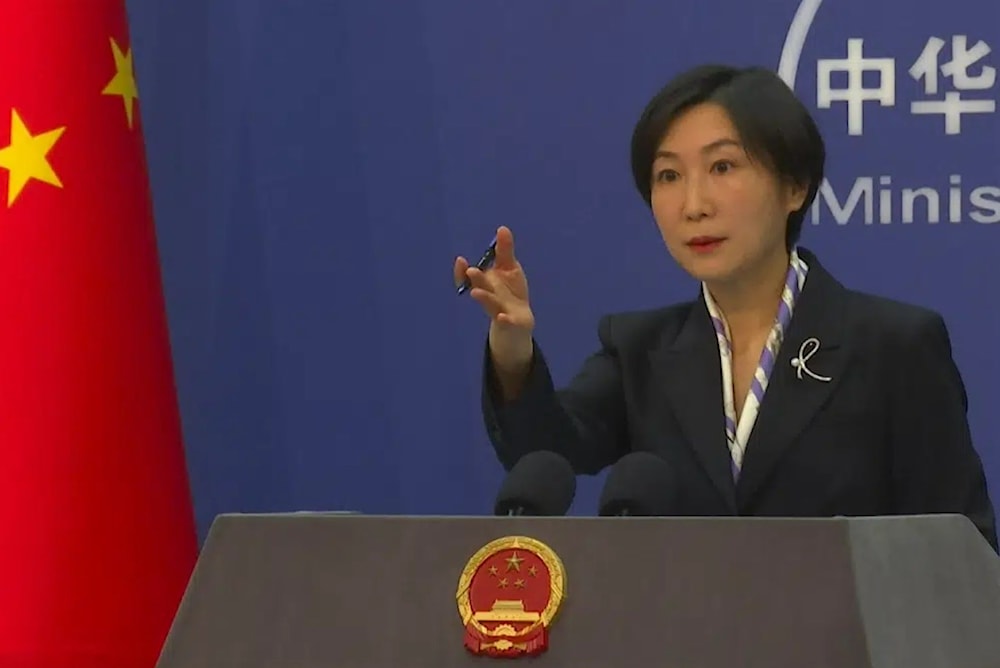China says US interfering in its internal affairs
China accuses the United States of interfering in its internal affairs amid heightened tensions between the two parties.
-

Chinese Foreign Ministry spokesperson Mao Ning gestures during a press conference at the Ministry of Foreign Affairs in Beijing, on March 1, 2023. (AP)
The Chinese Foreign Ministry has expressed strong opposition to the US' newly signed "Promoting a Resolution to the Tibet-China Dispute Act," labeling it a severe interference in China's internal affairs.
The legislation, signed into law by US President Joe Biden on Friday, riled up Beijing as a flagrant violation of the US' positions and commitments.
In a statement released on Saturday, the Chinese Foreign Ministry accused the US "Promoting a Resolution to the Tibet-China Dispute Act" of violating "the US government's long-held position and commitments and the basic norms governing international relations, grossly interferes in China's domestic affairs, undermines China's interests, and sends a severely wrong signal to the 'Tibet independence' forces."
The Chinese government has lodged a formal protest with the United States, reaffirming its stance that Tibet has been an integral part of China since "ancient times" and that its internal matters should remain free from foreign intervention. The ministry emphasized that any efforts to destabilize the region would not succeed.
Beijing has urged Washington to uphold its commitment to recognizing Tibet as part of China, cautioning that failure to do so will prompt China to "take resolute measures to firmly defend its sovereignty."
There have been various issues between China and the United States regarding what the former views as territories that fall under its sovereignty, such as Taiwan, Hong Kong, and Tibet, with Washington seeking to stoke tensions with China by supporting the separatist movements within said territories.
China criticized in February a visit by a US delegation to Taiwan as "interference", following the arrival of the House of Representatives committee chairman on China and four other lawmakers in the self-ruled island.
"China always resolutely opposes any form of official exchange between the United States and Taiwan authorities, and resolutely opposes the United States' interference in Taiwan affairs in any way or under any pretext," Foreign Ministry Spokesperson Mao Ning said during a regular press conference.
"We urge the United States to recognize the extreme complexity and sensitivity of the Taiwan issue," Mao said, calling on the US to respect the one-China principle and cease official exchanges with Taiwan.
US vows utter support for Taiwan
It is worth noting that Taiwan considers the United States its primary ally, and the island has been a focal point of tensions with China. Meanwhile, Beijing asserts territorial claims over Taiwan and has constantly affirmed its opposition to Washington's increasingly hostile policies against Beijing and its encroaching on its geopolitical sphere, particularly regarding Taiwan.
Mike Gallagher, a prominent critic of China, expressed his belief that US support for Taiwan would remain unchanged regardless of the outcome of the 2024 presidential election.
"I am very confident that support for Taiwan will continue regardless of who occupies the White House," he said.
He cautioned Beijing against making any attempts to invade Taiwan, emphasizing that such actions would be "extremely unwise."
Earlier, President Tsai expressed her appreciation for the visit of US lawmakers, noting that their presence serves as a tangible demonstration of "unwavering US support for Taiwan's democracy."
"We will continue to advance our international partnerships and engage with the world. In 2024, we hope to see even more Taiwan-US exchanges in a range of domains," she said.

 4 Min Read
4 Min Read








